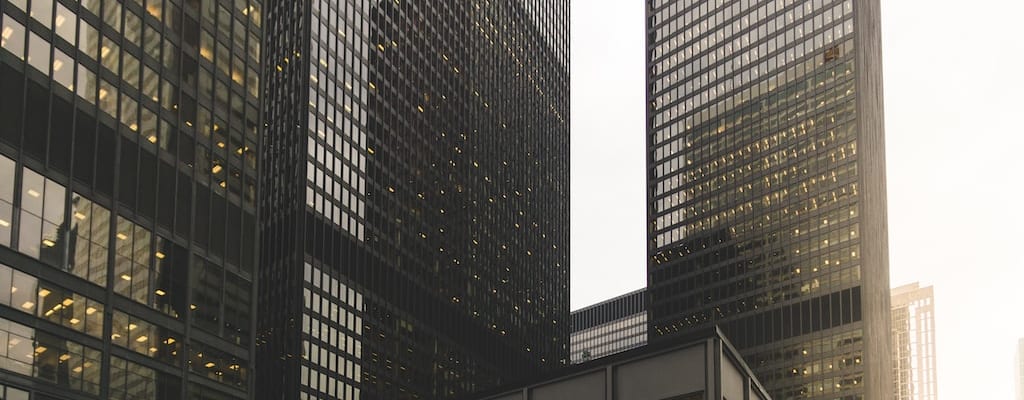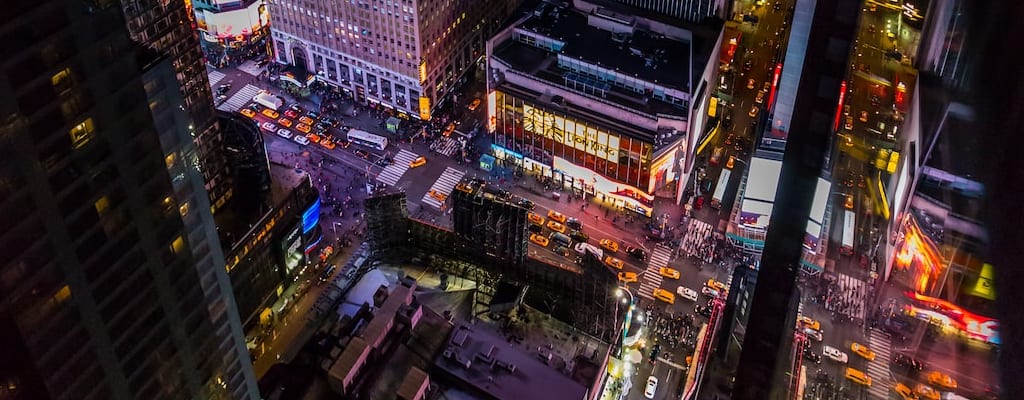concrete jungle: Idiom Meaning and Origin
What does ‘concrete jungle’ mean?
The idiom "concrete jungle" refers to a modern and urbanized place that lacks natural elements and is dominated by buildings and infrastructure.

Idiom Explorer
The idiom "lay of the land" refers to understanding or becoming familiar with a situation or environment. It implies gaining knowledge about the current state, conditions, or dynamics of a particular situation or place.
The idiom "law of the jungle" refers to a situation where people act in a selfish, ruthless, and survival-oriented manner, with no regard for moral or ethical principles. It implies a chaotic and competitive environment where only the strongest and most cunning individuals succeed.
The idiom "keep off the streets" means to stay indoors or avoid going outside, often because of dangerous or unsafe conditions on public roads or in the surrounding area.
The idiom "jungle telegraph" refers to the transmission of information or news through informal or unofficial channels, typically in a rapid and widespread manner. It emphasizes the idea of communication in a network-like fashion, reminiscent of the way messages travel in a dense, interconnected jungle.
The idiom "ivory tower" refers to being secluded or detached from the realities and practicalities of everyday life, often used to describe intellectuals or academics who are disconnected from the concerns of the general population.
The idiom "in the world" is used to emphasize something by placing it in a broader context. It implies that there is no greater or more extreme example of that thing anywhere else.
The idiom "in the weeds" means being overwhelmed or swamped with work or tasks, typically to the point of being unable to keep up or falling behind.
An idiom that means an extremely small or tight space, often used to convey a sense of constriction or being cramped.
The idiom "hustle and bustle" refers to a busy and noisy environment filled with various activities and movement.
An idiom used to describe someone leaving or departing. It implies a physical or metaphorical departure from a place or situation.
Urban Enigma
The idiom "concrete jungle" is widely used in colloquial English to describe a city or urban environment that is perceived as harsh, unforgiving, and lacking in natural elements. It reflects the sentiment that cities can be overwhelming, isolating, and devoid of the tranquility and connection to nature that many people crave. The phrase emphasizes the contrast between the artificiality and overwhelming nature of the urban landscape compared to the tranquility and abundance of nature.
One theory suggests that the idiom "concrete jungle" emerged during the period of rapid urbanization and industrialization in the early 20th century. This comparison was particularly drawn to envisioning New York City as a city that could be perceived as a jungle made of concrete. The towering skyscrapers, crowded streets, and dense population inspired the comparison, symbolizing the overwhelming and chaotic nature of urban life. This notion aligns well with the concept of an urban jungle, which portrays cities as environments dominated by fierce competition, unpredictability, and survival of the fittest.
Another theory proposes that the idiom may have originated from the 1949 novel "The Concrete Jungle" written by Charles Willeford. While the novel itself is not widely known, some speculate that it may have contributed to the popularization of the phrase, given its exploration of the gritty realities of urban life.
Despite the exact origins of the idiom remaining uncertain, it has become firmly ingrained in everyday language. It effectively captures the essence of urbanization and conveys a sense of the challenges and struggles associated with living in a fast-paced, metropolitan setting. The use of the term "concrete" in the phrase emphasizes the dominance of man-made structures and minimization of natural elements within the urban environment.
When someone refers to a place or environment as a "concrete jungle," it is typically accompanied by a negative connotation. The idiom reflects the common sentiment that cities can be overwhelming, isolating, and devoid of the tranquility and connection to nature that many people crave. It highlights the human desire for green spaces, open landscapes, and a respite from the relentless pace of urban life.
Another related idiom that can be associated with "concrete jungle" is "asphalt jungle." This idiom also portrays cities as harsh and unforgiving environments. While "concrete jungle" emphasizes the domination of man-made structures, "asphalt jungle" focuses on the urban landscape and streets made of asphalt. Both idioms convey the challenging and competitive nature of city life, where individuals must navigate through the complexities and hazards of the urban environment in order to thrive.
Yet another related idiom is "ivory tower." Unlike "concrete jungle" and "asphalt jungle," which emphasize the harshness of urban environments, "ivory tower" has a different connotation. It refers to a place or situation where individuals are isolated from the realities of the world, often associated with academia or intellectual pursuits. While "concrete jungle" and "asphalt jungle" describe the challenges and struggles of urban life, "ivory tower" signifies a detachment from the practicalities and harshness of the outside world.
These idioms collectively contribute to the nuanced understanding of different aspects of city life. While "concrete jungle" and "asphalt jungle" focus on the challenges and competition inherent in urban environments, "ivory tower" highlights the isolation and detachment from the realities of the world that can exist within certain contexts. Each idiom offers a unique perspective on the complexities and dynamics of life in the modern city.
The idiom "concrete jungle" is commonly used to describe cities or urban environments that are perceived as harsh, unforgiving, and lacking in natural elements. Its origins can be traced back to the early 20th century and it has since become firmly ingrained in everyday language. When used in conjunction with related idioms such as "asphalt jungle" and "ivory tower," a more nuanced understanding of different aspects of city life can be achieved. Together, these idioms contribute to a broader understanding of the challenges, competition, isolation, and detachment that can characterize life in urban environments.
Example usage
Examples of how the idiom "concrete jungle" can be used in a sentence:
- The city center is a concrete jungle, filled with towering skyscrapers and bustling streets.
- After living in a small town all his life, John found himself overwhelmed by the concrete jungle of New York City.
- Amidst the concrete jungle, there are small pockets of green parks that provide a respite from the busy city life.
More "Urban" idioms
We missed the mark - nothing found.



